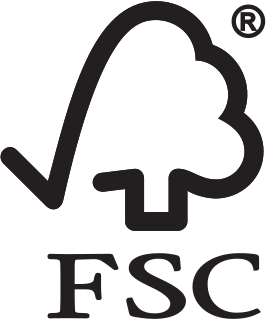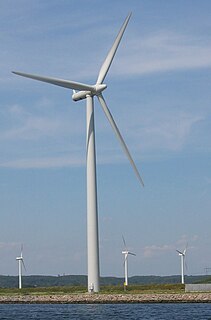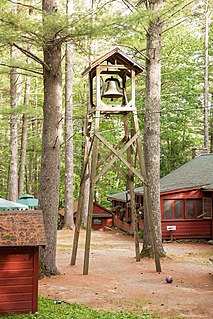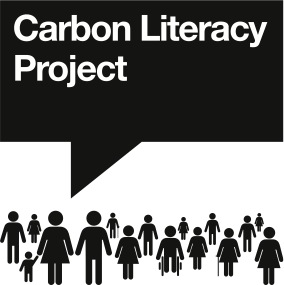Related Research Articles
Carbon neutrality is a state of net-zero carbon dioxide emissions. This can be achieved by balancing emissions of carbon dioxide with its removal or by eliminating emissions from society. The term is used in the context of carbon dioxide-releasing processes associated with transportation, energy production, agriculture, and industry.

The Forest Stewardship Council (FSC) is an international non-profit, multistakeholder organization established in 1993 that promotes responsible management of the world's forests. It is an example of a market-based certification program used as a transnational environmental policy.

Green building refers to both a structure and the application of processes that are environmentally responsible and resource-efficient throughout a building's life-cycle: from planning to design, construction, operation, maintenance, renovation, and demolition. This requires close cooperation of the contractor, the architects, the engineers, and the client at all project stages. The Green Building practice expands and complements the classical building design concerns of economy, utility, durability, and comfort. In doing so, the three dimensions of sustainability, i.e., planet, people and profit across the entire supply chain need to be considered.
A carbon credit is a generic term for any tradable certificate or permit representing the right to emit one tonne of carbon dioxide or the equivalent amount of a different greenhouse gas (tCO2e).
The Clean Development Mechanism (CDM) is a United Nations-run carbon offset scheme allowing countries to fund greenhouse gas emissions-reducing projects in other countries and claim the saved emissions as part of their own efforts to meet international emissions targets. It is one of the three Flexible Mechanisms defined in the Kyoto Protocol. The CDM, defined in Article 12 of the Protocol, was intended to meet two objectives: (1) to assist non-Annex I countries achieve sustainable development and reduce their carbon footprints; and (2) to assist Annex I countries in achieving compliance with their emissions reduction commitments.

A carbon offset is a reduction or removal of emissions of carbon dioxide or other greenhouse gases made in order to compensate for emissions made elsewhere. Offsets are measured in tonnes of carbon dioxide-equivalent (CO2e). One ton of carbon offset represents the reduction or removal of one ton of carbon dioxide or its equivalent in other greenhouse gases. Both the Oxford Principles for Net Zero Aligned Offsetting and the Science Based Targets initiative's Net-Zero Criteria argue for the importance of moving beyond offsets based on reduced or avoided emissions to offsets based on carbon that has been sequestered from the atmosphere, such as CO2 Removal Certificates (CORCs).
The Programme for the Endorsement of Forest Certification (PEFC) is an international, non-profit, non-governmental organization which promotes sustainable forest management through independent third party certification. It is considered the certification system of choice for small forest owners.

Sustainable forest management (SFM) is the management of forests according to the principles of sustainable development. Sustainable forest management has to keep the balance between three main pillars: ecological, economic and socio-cultural. Successfully achieving sustainable forest management will provide integrated benefits to all, ranging from safeguarding local livelihoods to protecting biodiversity and ecosystems provided by forests, reducing rural poverty and mitigating some of the effects of climate change. Forest conservation is essential to stop climate change.

The Carbonfund.org Foundation is a 501(c)(3) not-for-profit organization based in East Aurora, NY that provides carbon offsetting and greenhouse gas reduction options to individuals, businesses, and organizations. Carbonfund.org Foundation purchases and retires certified carbon offsets on behalf of its donors. Donors are given a choice of project type to which they may donate, including renewable energy, reforestation, and energy efficiency projects. Carbonfund.org Foundation sources carbon credits verified by the Verra carbon standard and Gold Standard. The organization has helped develop four Reducing Emissions from Deforestation and Degradation (REDD+) projects in Brazil under the VERRA and Climate, Community and Biodiversity standards.
The Sustainable Forestry Initiative (SFI) is a sustainability organization operating in the U.S. and Canada that works across four pillars: standards, conservation, community, and education. SFI has two youth education initiatives: Project Learning Tree and Project Learning Tree Canada. SFI is the world's largest single forest certification standard by area. SFI is headquartered in Ottawa and Washington, D.C.

ClimateCare is a profit for purpose environmental and social impact company known for its role providing carbon offset services, with a particular focus on using carbon and other results based finance to support its 'Climate+Care Projects'. It also provides businesses and governments with sustainable development programmes, environmental and social impact measurement and project development.
EcoSecurities is a company specialised in carbon markets and greenhouse gas (GHG) mitigation projects worldwide. EcoSecurities specialises in sourcing, developing and financing projects on renewable energy, energy efficiency, forestry and waste management with a positive environmental impact.

A low-carbon fuel standard (LCFS) is a rule enacted to reduce carbon intensity in transportation fuels as compared to conventional petroleum fuels, such as gasoline and diesel. The most common low-carbon fuels are alternative fuels and cleaner fossil fuels, such as natural gas. The main purpose of a low-carbon fuel standard is to decrease carbon dioxide emissions associated with vehicles powered by various types of internal combustion engines while also considering the entire life cycle, in order to reduce the carbon footprint of transportation.

myclimate was spun off from the Swiss Federal Institute of Technology Zurich in 2002 as a nonprofit climate protection organisation based in Switzerland to enable climate protection with economic mechanisms such as price-tagging carbon dioxide and integrating the externality into the market. They promote climate protection on three levels: avoidance techniques such as capacity building and teaching, reduction and carbon offsetting. myclimate advocates for the development of a carbon market while setting new standards in carbon emissions and in designing a sustainable society.
The International Carbon Reduction and Offset Alliance is a non-profit membership organisation which promotes best practice across the voluntary carbon market. ICROA’s membership consists of those established carbon reduction and offset providers based in the United States, European and Asia-Pacific markets which commit to the ICROA Code of Best Practice.
The Climate, Community & Biodiversity Alliance (CCBA) is an initiative led by Conservation International, CARE, The Nature Conservancy, Rainforest Alliance, and the Wildlife Conservation Society to promote the development of land management activities.
The Verified Carbon Standard (VCS), or Verra, formerly the Voluntary Carbon Standard, is a standard for certifying carbon emissions reductions. VCS is administered by Verra, a 501(c)(3) organization.
The Woodland Carbon Code is the UK standard for afforestation projects for climate change mitigation. It provides independent verification and validation and assurance about the levels of carbon sequestration from managed woodland and their contribution to climate change mitigation.

Carbon Literacy is the awareness of climate change and the climate impacts of mankind's everyday actions. The term has been used in a range of contexts in scientific literature and in casual usage, but is most associated with The Carbon Literacy Project (CLP).
Pacific Forest Trust is an accredited non-profit conservation land trust that advances forest conservation and stewardship solutions. Its mission is to sustain America’s forests for their public benefits of wood, water, wildlife, and people’s wellbeing, in cooperation with landowners and communities.
References
- ↑ Peters-Stanley, Molly (2012-09-18). "Gold Standard Acquires CarbonFix In Bid To Reshape Forest Carbon Landscape". Ecosystem Marketplace. Archived from the original on 2015-09-22. Retrieved 2021-04-28.
- ↑ "CarbonFix Standard: Criteria and Methodology" (PDF). 2009. Archived (PDF) from the original on 2021-04-28.
- ↑ Merger, Eduard; Dutschke, Michael; Verchot, Louis (June 2011). "Options for REDD+ Voluntary Certification to Ensure Net GHG Benefits, Poverty Alleviation, Sustainable Management of Forests and Biodiversity Conservation". Forests. 2 (2): 550–577. doi: 10.3390/f2020550 .